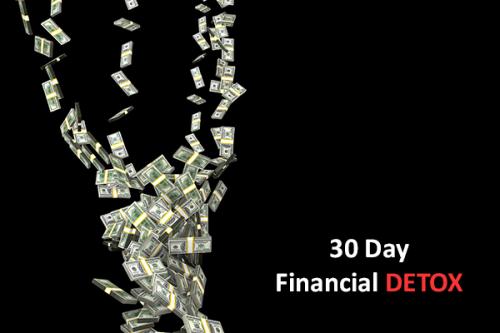30 Day Financial Detox

Have you heard of a detox?
Seems to be all the rage in diets nowadays.
But what about a financial detox?
If we consider the term, a detox means to follow a restricted plan for a certain period of time in order to cleanse the body of toxins.
Well when we consider some of the financial messes that we get into, including poor spending habits, not paying our bills on time, and so on we need a way to way to get ourselves back on track. And what better than a detox.
So let’s embrace this concept and get your finances back in shape so you can enjoy the freedom and security that comes from knowing that you are taking care of business when it comes to your money.
But let’s face it, sometimes before you can enjoy such bliss and peace of mind that financial health can offer, you need to do a bit of cleansing. A financial detox helps to eliminate bad habits that may be setting you back from living your dreams.
So let’s cut to the chase and start your 30 day financial detox.
Week 1 – Eliminate The Obvious Toxins
Let’s start with the obvious…OVERSPENDING. If you really want to get your finances back on track you need to start with being honest with yourself. Are you spending more than you can afford? Are you buying things that you don’t need?
This may be one of your most difficult challenges. But in order to eliminate your financial toxins you need to start with addressing the source. Here are the two main unhealthy habits that people fall into. Does this sound like you?
Credit card repayments: What junk food is to the body, interest and fees could be to your budget. On your next payday, consider paying more than you have to against your credit card bill. Taking out these financial toxins could eventually help free up some cash to sink back into your budget and future statements.
Another option is to consider refinancing existing debt with a personal loan or credit card that offers low interest rates on balance transfers. When doing so, it’s important to understand the terms and conditions, as well as paying the minimum amount due and balance off in time.
Bad habits: When it comes to the body, taking out the toxins often means giving up all the bad stuff – caffeine, alcohol and fried goodies.
When it comes to the wallet, this means temporarily cutting out some of the bad stuff too – shopping sprees, late-night internet purchases, impulse items you want rather than need, regular dinners out and yes, even cutting the three-a-day cappuccino habit will help too. via: A financial detox for you in the New Year
Getting into debt is easy, but getting out of it is much more like a nightmare. Ogden Nash, once said, “Some debts are fun when you are acquiring them, but none are fun when you set about retiring them.” How true is that?
And it really does not matter what kind of debt you have. Credit cards, banks loans, retail cards, the source is irrelevant. All require planning and discipline if you intend on paying them down.
Week 2 – Go Cold Turkey
You have started feeling the pain. Your fingers itching to pull out your credit card…
Like quitting any number of other addictive behaviors, toxic spending habits can be stopped by drastic measures — going cold turkey. The key here is to know that the stoppage is temporary. You’re going to stop dining out, stop getting weekly manicures, stop going on spending sprees at Target — for a month. One month. You can do this. via: How to Go on a Financial Detox Or by subscribing to our free credit repair tips by email:
To Your Credit Score?
Download Our Free Checklist and Get Back On Track
Week 3 – Developing Good Habits
Part of your success is based on totally eradicating bad habits, but to make those changes permanent you need to replace them with good ones. Here is a list of healthy habits to help get you in perfect shape.
- Sort out your credit and debts immediately: Check your credit report. Manage your credit. Manage your debt. Avoid store credit cards.
- Sort out your savings and insurance: Get a decent interest level in your savings account. Realize that saving in a low interest savings account might not actually be the best use of your money. Invest in yourself.
- Become actively involved in your finances: Think about where the money is going, what it is doing. Undertake weekly money management tasks.
- Watch out for fraud: Destroy any unneeded receipts and statements; Retain the receipts you do need and compare them against credit card and other financial statements; Never disclose your personal information to someone on the phone. Redirect your mail immediately when you move. Check your credit report periodically. Remember that if a deal seems too good to be true, it probably is.
- Track your expenditures: Identify where your money is going and whether or not each expenditure is necessary or frivolous. Saving receipts. Keeping a notebook handy that you can write down prices and purchases as they occur.
- Think before you buy: Save, then buy. Avoid impulse buying. Carry it around the store for a while. Don’t buy into a brand just because you always have. Learn how to haggle and don’t be uncomfortable about it.
- Take charge of your home space: Sell things that you aren’t using or don’t want. Declutter your home and your life. Look at your energy usage.
- Take charge of your earnings: Earn what you deserve. Increase your brand value.
- Balance your life and your work: Balance your life and your work.
- Teach your children about finances: Teach your children about finances.
via: How to Detox Your Finances
Week 4 – Make it Permanent
Now that you have a really solid base in place and three weeks of discipline under your belt it’s time to take it to the next level. Your efforts will soon start paying off so let’s make it permanent.
If you’re going to take away your spending habit, raise your odds of success by replacing it with something else that you enjoy. Evaluate your spending and general sense of well being every month. If you’re having spending withdrawals, you might need a different substitute. Find a partner, coach or group that can keep you accountable.
A spending detox might be just what you need to get your spending under control and help to guarantee a healthier financial future. Change is challenging, but not changing a pattern of overspending will eventually prove to be a greater challenge. Do it now. Be financially strong! via: 5 Steps to a Spending Detox
Enjoy Your Freedom
Congratulations if you made it this far! By now you are a master of your finances and you should be proud of yourself for having had the discipline to comply. Maybe it wasn’t easy, but for sure it is rewarding.



Leave a Reply